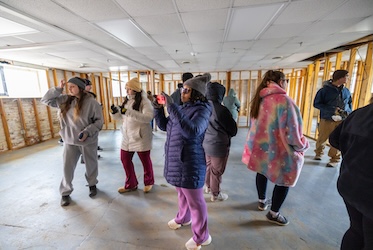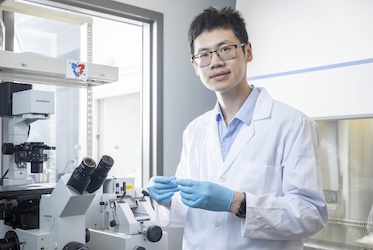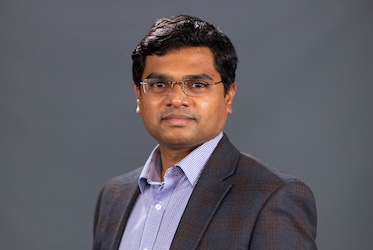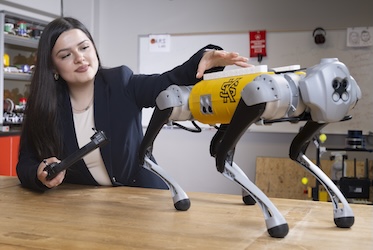
Destination: Germany and France
KENNESAW, Ga. | Jun 14, 2019
Civil engineering students explore sustainability in Europe
Each semester, Kennesaw State University students participate in faculty-led education abroad programs to enhance their studies and gather perspective from nearly 40 countries worldwide. This summer is no different, as KSU’s Division of Global Affairs offers more than 50 programs covering a myriad of disciplines from business to architecture, humanities to engineering.
In a recent first-ever engineering education abroad program, 10 Kennesaw State University students and one Mercer University student toured Germany and France in a pair of courses on environmental engineering and sustainable practices.
After arriving in early May, the students visited several sustainable wastewater treatment facilities, cities, community housing developments and organic farms in order to better understand how practices in European Union member countries differ from those in the U.S. While there, students engaged in community service activities and met with local sustainability experts, visiting area landmarks and indulging in local cuisine in their free time. The program was led by M. A. Karim and Roneisha Worthy, of Kennesaw State’s Department of Civil and Construction Engineering.
Skylar Rose, Steve Hocutt and Sylvestre Traore, all of whom are pursuing degrees in KSU’s Southern Polytechnic College of Engineering and Engineering Technology, were among those who traveled to Europe to broaden their studies.

Why was it important to participate in education abroad?
Traore: “It was a great opportunity to learn how other countries approach certain issues. Additionally, I enjoy traveling all around the world and learning about other cultures.”
Hocutt: “Previously, I participated in two study abroad programs through a different university, and those experiences were very rewarding. All of them have enriched my cultural understanding and experience, and provided memories I will always have.”
What was the best part of your education abroad experience?
Traore: “My favorite part was our field trip to Strasbourg, France. We toured a sustainable district in Strasbourg on bike and visited the tallest self-sufficient building in the world. It was also interesting to see how a former industrial zone was transformed to a thriving ecological district.”
Rose: “The best part of the trip was getting to know all the wonderful people who shared this experience with me. There were only 11 of us and I only knew one before leaving the U.S. However, throughout the trip we all became good friends. Since returning home, we all still continue to make plans together, and that is one of the most rewarding things of all.”

In what ways did your trip enhance your overall experience at KSU?
Hocutt: “From a cultural standpoint, it was wonderful to experience new boundaries and approaches to food, sustainable living and political viewpoints. From a technical standpoint, the experience allowed me to witness the operation of sustainable and energy efficient wastewater treatment technologies not currently used in our area. Seeing the technologies in person as well as speaking to the operators and engineers who maintain and monitor the equipment each day allowed me to acquire direct and experienced-based knowledge. Often, what we learn in a classroom setting back home can be specific to U.S. standards or processes. Taking the initiative to learn alternate methods and approaches has broadened my skill set, reinforced my classroom learning and increased my marketability with potential future employers.”
What advice would you give other students who are interested in education abroad?
Rose: “Traveling is a very important life experience, especially traveling internationally. Any student should seek out these experiences, and being able to knock out credits while doing so is a huge plus. Being immersed in a new country with different traditions and history can broaden your education and offer you new perspectives.”
Hocutt: My primary advice is to be prepared and plan accordingly. I suggest gathering the course material and becoming familiar with the concepts weeks ahead of the trip. This will ease some stress of prepping for exams and assignments and allow you to fully enjoy the cultural experience of being abroad.”
– Travis Highfield
Photos submitted
Related Stories

Kennesaw State architecture, engineering students reimagine Asheville's devastated River Arts District

KSU researcher harnessing digital twin technology to improve heart care

Kennesaw State University researcher, students explore clean energy storage solutions

Kennesaw State student exploring the use of robotics in agriculture
A leader in innovative teaching and learning, Kennesaw State University offers undergraduate, graduate, and doctoral degrees to its more than 47,000 students. Kennesaw State is a member of the University System of Georgia with 11 academic colleges. The university’s vibrant campus culture, diverse population, strong global ties, and entrepreneurial spirit draw students from throughout the country and the world. Kennesaw State is a Carnegie-designated doctoral research institution (R2), placing it among an elite group of only 8 percent of U.S. colleges and universities with an R1 or R2 status. For more information, visit kennesaw.edu.















